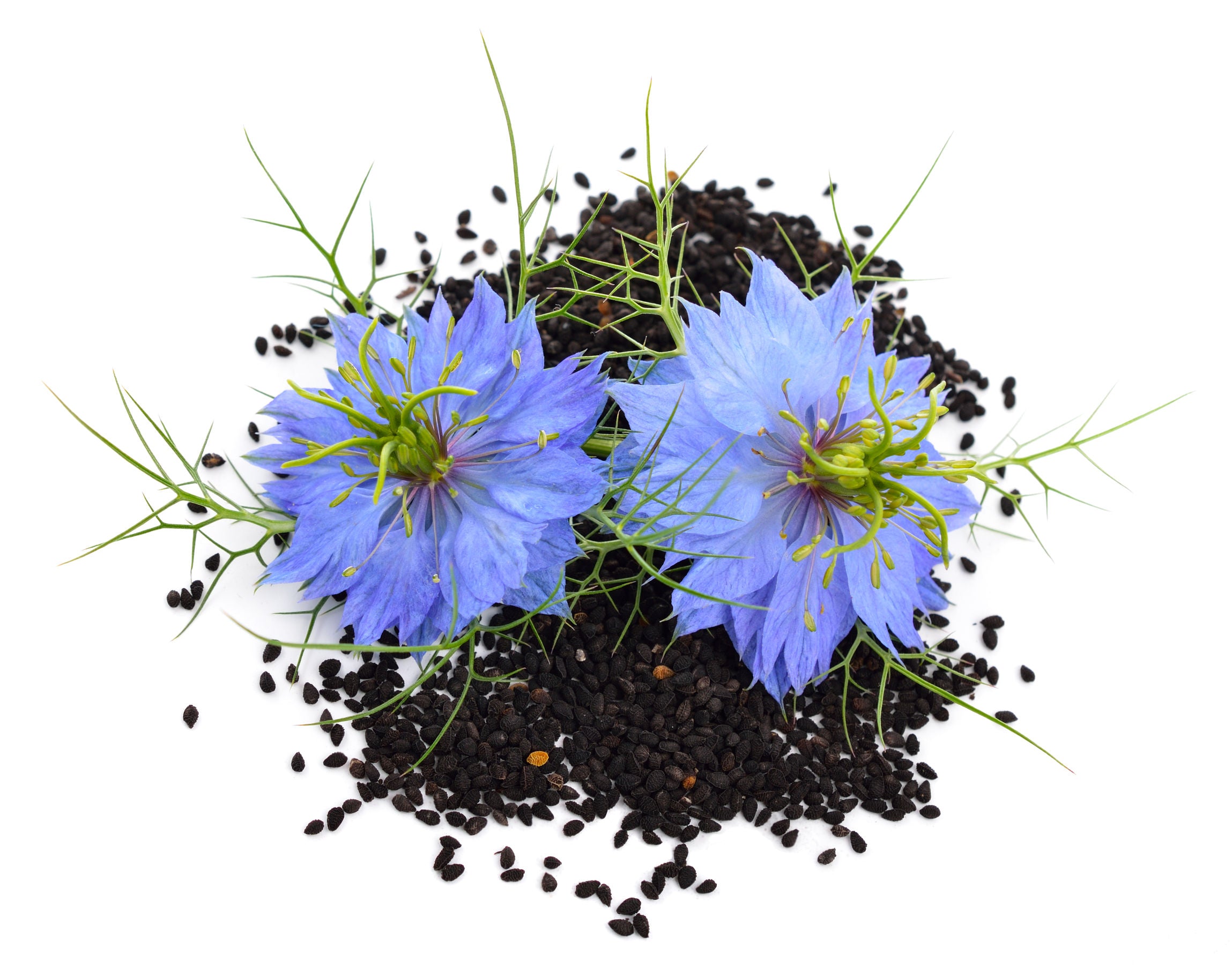Black Cumin Seed, also known as Black Seed, is probably one of the most underrated superfoods you didn't know the health food store had in stock. Like many of nature's most giving plants, Black Cumin Seed brings a cornucopia of benefits to your body, both internally and externally. Native to the Mediterranean, Northern Africa, and the Indian Subcontinent, this nutritionally dense, antioxidant rich, immune boosting little seed has earned the reputation of being a panacea. Let's delve into why.
Medicinal Uses: History to Modernity
Use of Black Cumin Seed, and Black Cumin Seed Oil, stretches back at least 3,500 years in recorded history. Found inside of Blue Nigella Fennel Flowers, the seeds' medicinal uses seem to have first been discovered in Ancient Egypt, where it was used extensively for infection, respiratory conditions, and maintaining a youthful visage. Not only were jars of the precious oil found in King Tutankhamen’s tomb, but it was used extensively by Egyptian Noble women to maintain their beauty, Queens Cleopatra and Nefertiti included. In Ancient Greece Hippocrates (the Father of Modern Medicine) frequently recommended Black Cumin Seeds for general wellness and as a deterrent to the aging process. In the Middle Ages, wealthy European Nobles who were lucky enough to afford the oil applied it to their bodies to protect themselves against coughs, colds, flus, and the Bubonic Plague.
Fast forward to modernity, we're now able to scientifically confirm the oil's antiviral, antibacterial, antifungal, anticarcinogenic, and anti-inflammatory properties, in addition to its ability to assist with respiratory conditions (from asthma to coughs), cholesterol management, blood sugar regulation, brain health, rosacea, varicose veins, age spots, and wrinkles.
The Scientific Breakdown
Black Cumin Seed (Latin: Nigella Sativa) contains a number of nutrients: Vitamin B1, B2, and B3, Vitamin E, copper, zinc, phosphorus, folic acid, iron, calcium, magnesium, 8 essential amino acids, along with omegas like oleic acid (the good stuff in olive oil), eicosapentaenoic acid (EPA), and docosahexaenoic acid (DHA- like in fish oil) - just to name a few. But there are 3 chemical compounds that make this seed exceptional: Beta sitosterol, Crystalline nigellone, and Thymoquinone.
EPA and DHA are both types of Omega 3's, with a growing base of scientific data demonstrating their ability to protect the brain as it ages, fight certain types of cancer, inflammation, and lowering LDL cholesterol (the undesirable kind) while raising HDL (the desirable kind).
The Beta sitosterol is a waxy plant compound that looks like cholesterol in your body, and subsequently assists in regulating the body's cholesterol by limiting how much can enter the bloodstream. It can help to lower overall cholesterol, but note that Beta sitosterol won't raise good cholesterol. This anti-inflammatory compound is also known to help maintain a healthy prostate.
Crystalline nigellone and Thymoquinone are the two most researched elements of the seed. Research is demonstrating that crystalline nigellone is the source of the plant's respiratory-supporting properties, reducing allergic reactions and hay fever symptoms, and ameliorating bronchitis.
Saving the most exceptional element for last, the Thymoquinone is exclusive to Black Cumin Seed; it has never been found in any other plant. Thymoquinone is increasingly researched as it shows efficacy in treating degenerative diseases, including cancer. It's a potent anti-oxidant and anti-inflammatory molecule that has been shown to alter molecular and signaling pathways, helping the body to heal.
How to Use It
Internal: Black Cumin Seed oil can be taken as a straight oil or as a pill. The oil can taste bitter and hot, so some prefer to take it in capsule form. The standard dosage is 1/2 a teaspoon, or 2.5 mls, taken on an empty stomach; however, dosage should be tailored to the individual. Oil is not always easily digested and can strain the liver and gallbladder. It can exacerbate certain types of digestive issues, and a lower dosage might be recommended. If you have liver, gallbladder, or digestive concerns, please consult a professional before ingesting Black Cumin Seed oil.
Author's note: This article focuses specifically on the plant oil because most of the scientific research done on Black Cumin Seed is specific to the oil, or extracts from the oil, eg. beta sitosterol and thymoquinone. However, we recognize that proponents of whole foods diets would prefer to consume the seeds. The seeds are more difficult to find, and buyers should take care to ensure they source a high quality. Standard dosage is 1 Tablespoon of seeds, soaked overnight in water. Please consult a professional before consuming the seeds if you have intestinal concerns such as Diverticulitis, Crohn's Disease, or Irritable Bowel Syndrome.
Topical: External use is more straightforward, simply apply some of the oil to your skin and massage it in, like a serum. Apply daily, spending extra time massaging the oil into any kind of blemish, redness, age spot, or visible vein.
Black Cumin Seed is one of the primary active ingredients in Vedic Botanicals Defense Balm and Radiance Face Cream.
For Further Reading:
- Bacterial infections: As effective against salmonella/staph poisoning as antibiotics, even antibiotic-ineffective species. (Sarwar A, Latif Z. Nat Prod Res. 2014 Aug 22:1-5, University of Punjab, Pakistan)
2. Immune function: Aids viral respiratory illnesses by boosting natural killer cell activity. (Int J Immunopharmacol. 2000 Sep;22(9):729-40 & Pak J, Biol Sci. 2011 Dec 1;14(23):1038-46)
3. Anti-inflammatory: Ali BH1, Blunden G. “Pharmacological and toxicological properties of…”Phytother Res. 2003 Apr;17(4):299-305. King Saud University, Buraydah, Saudi Arabia
4. Antioxidant: Crit Rev Food Sci Nutr. 2010 Aug;50(7):654-65
5. Analgesic: Hajhashemi V1, et. al. “Black cumin seed essential oil, as a potent analgesic, anti-inflammatory…” Phytother Res. 2004 Mar;18(3):195-9. Isfahan University of Medical Sciences, Iran
6. Psoriasis/ezcema: Equivalent to standard eczema drug tazarotene; helps stop psoriasis from spreading. (Dwarampudi LP, Palaniswamy D, Pharmacogn Mag. 2012 Oct;8(32):268-72)
7. Cancer: Increases growth of bone marrow cells, inhibits tumour growth, supports immune macrophages/helper T-cells. Intern. J Immunopharm, 2005 & Oxford U’s Digestive Disease Sciences 2009 & Journal of Ethnopharm 2011
8. Asthma/Allergies: Anti-inflammatory compounds reduce asthma, hayfever, allergy symptoms. (Pulm Pharmacol Ther. 2009 Feb;22(1):37-43)
9. Diabetes: As adjuvant, improved glycemic control & blood glucose balancing due to improved insulin sensitivity. (2010, King Faisal University, Saudi Arabia & 2011, University of Montreal, Crit Rev Food Sci Nutr. 2010 Aug;50(7):654-65)
10. Vitamin E: Liu M, Wallin R, “Mixed tocopherols have stronger inhibitory effect on lipid peroxidation… J Cardiovasc Pharmacol 2002;39(5):714-21 & Qing Jiang, Stephan Christen, “Gamma Tocopherol, major form of vitamin E …, deserves more attention,” Am J Clin Nut, Vol. 74, No. 6, 714-722, 2001
11. Depression: Bin Sayeed MS, et al., “Nigella sativa L. seeds modulate mood, anxiety…” J Ethnopharmacol. 2014 Feb 27;152(1):156-62, University Dhaka, Bangladesh
12. Cardiovascular: Shabana A1, et al., “Cardiovascular benefits of black cumin…” Cardiovasc Toxicol. 2013 Mar;13(1):9-21. Depart. Cardiology, Hamad Medical Corp, Qatar
13. Mohannad Khader, Thymoquinone: emerging natural drug with … medical applications. ”Iran J Basic Med Sci. 2014 Dec; 17(12): 950–957. - https://www.frontiersin.org/articles/10.3389/fphar.2017.00656/full
About the Author: Rachel Warnock holds a Master's Degree in Ayurvedic Medicine from Maharishi International University and is the Lead Herbalist at Vedic Botanicals. She has 10 years of experience mixing herbs and working with individuals to meet their health and wellness goals, specializing in neurological and dermatological wellness.





